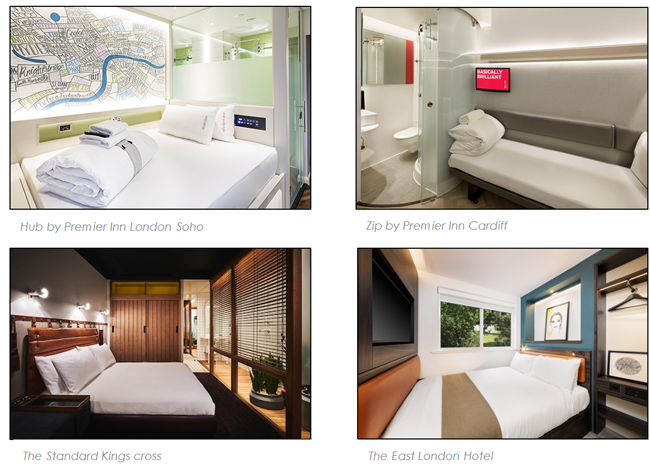Maximising space: the increasing volume of windowless hotel rooms
 30 July 2019
30 July 2019
With space in large cities at a premium, a new breed of space-saving hotel brands are utilising every square metre to efficiently provide smartly designed rooms in prime locations.
Whitbread has been in this market since the introduction of Hub by Premier Inn in Covent Garden, London in 2015 and there are now eight Hub hotels in London, three in Edinburgh and a further seven in the London pipeline. Z Hotels, easyHotels, and Point A, amongst others feature windowless rooms and have been developing portfolios mainly in London and key regional hubs such as Glasgow and Liverpool. Independent hotels are also getting in on the game with the recently opened East London Hotel in Bethnal Green a good example; by maximising the building envelope, including using two basement floors for bedrooms, this modern stylish hotel has a number of smaller rooms and some with no natural light.
Windowless rooms enable the floor plates of hotels to be used very efficiently; interior spaces or basements that would otherwise have been under-utilised can be re-purposed to provide additional accommodation. Using these spaces provides maximum design flexibility and the opportunity to add value to a hotel or development by increasing the number of rooms. With land costs at historic highs, and often planning restrictions on building heights, using these spaces can be key to making a development stack up.
Typically windowless rooms from the brands noted above are of a similar size to their windowed equivalent (10-12m2) and have the same in-room amenities. A light-well or light-box gives the rooms a substitute for natural daylight.

Windowless rooms and the wider compact hotel model are targeting the rise of a customer base that seeks a ‘no frills’ stay. Their key requirements are a well-located hotel at an affordable price-point. This type of customer generally falls into either of two categories: cost-conscious leisure visitors (often younger generation) or short-stay business travellers. These customers will spend very little time in their room, and so are willing to sacrifice on amenities to be in a prime location and save on price; albeit clever design to create a sense of space and investment in technology are also very important.
Guests are not being put off by the lack of windows; in fact our research with General Managers suggests it is the windowless rooms that sell out first, probably due to their lower price point. Notably, the lack of natural daylight is rarely the reason for a negative review.
Windowless rooms are not only found in limited service hotels. The Standard is a recently opened upscale hotel in Kings Cross that has relatively spacious windowless rooms (19m2-23m2) in the core of the hotel, creating extra rooms from space that would have otherwise not been utilised. These inner core rooms are popular with guests and often sell out before other rooms.
According to Whitbread, Hub by Premier Inn’s rooms are approximately 45% smaller than standard Premier Inn rooms at 11.4 m2 and quoted rates are up to 30% lower. But construction and operating costs are 25% lower resulting in comparably similar returns. Bedrooms at their new brand Zip are even smaller than Hub. The first Zip recently opened in Cardiff and boasts ultra-compact rooms at 8.5 m2. Unlike Hub, Zip does not offer guests the choice between a room with windows and one without, rooms are not cleaned daily and optional extras (such as superfast Wi-Fi) can be purchased. Zip offers rates from £19, significantly cheaper than a standard Premier Inn, from £65 in Cardiff.
The introduction of Zip shows that innovation in this market is far from over. The increasing trend for no-frills, prime located, budget accommodation is one not to be ignored. Although increasingly developers and hotel companies are looking to this trend, the compact model is in its infancy and new opportunities exist in prime UK cities as well as London.
If you are considering a new hotel development or looking to get the most out of your property, please contact Andrew Renouf ([email protected] or +44 (0)131 469 6026) and we will be happy to assist.
